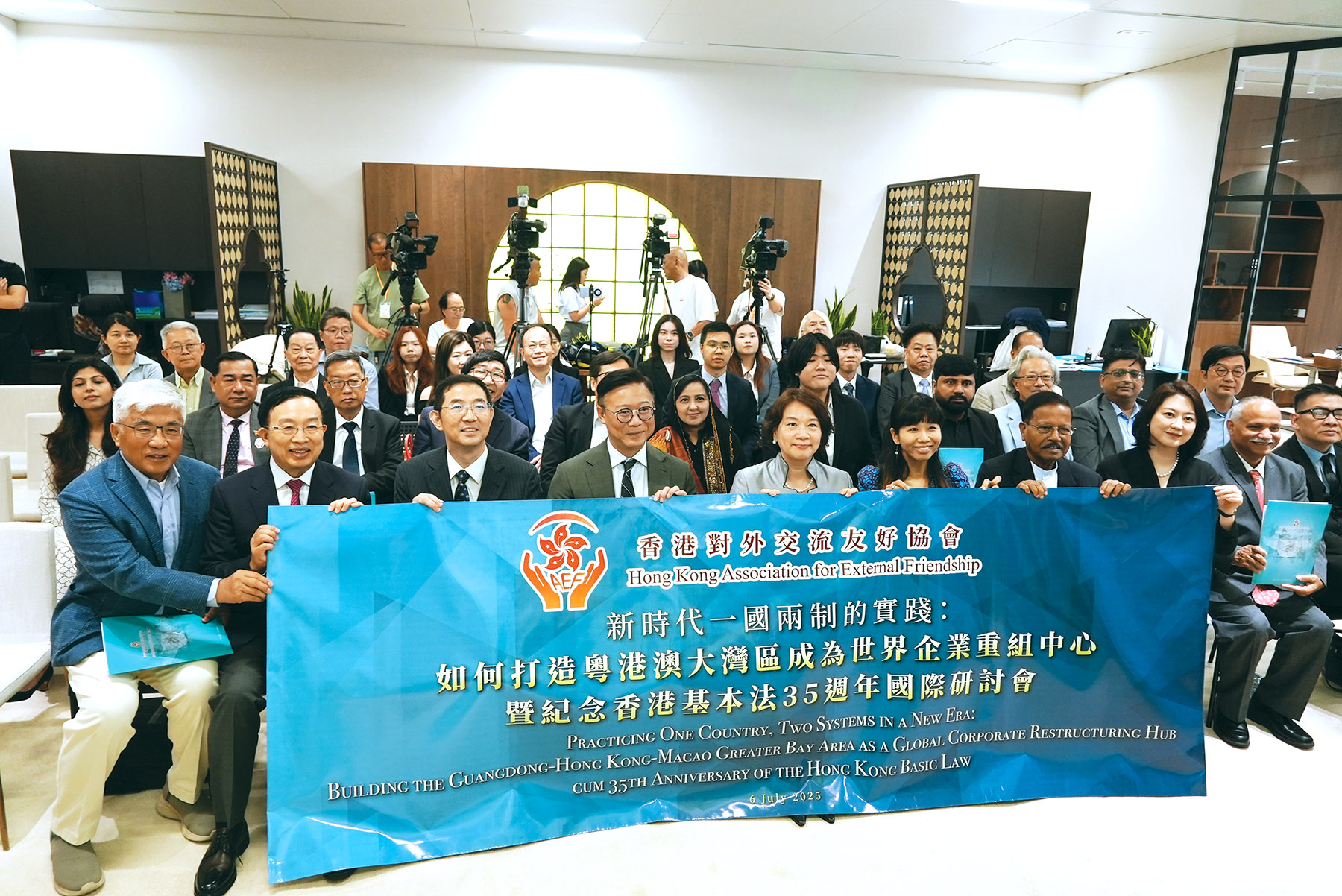
As Hong Kong has no statutory legal provisions yet to deal with cross-border corporate insolvency, the special administrative region government will support ways of tackling the problem and engage with stakeholders, panelists told the International Symposium on Global Corporate Restructuring Center.
The symposium, held on July 6, was the first event organized following the inauguration of the Hong Kong Association for External Friendship. It examined key topics, such as how the SAR’s free economic system can help the Guangdong-Hong Kong-Macao Greater Bay Area become a world-class corporate restructuring center, and the development of international mediation and corporate restructuring.
“Developing the Greater Bay Area into a global corporate restructuring center is indeed a hot topic and a subject worth pondering and studying for the HKSAR government, the legal profession, and even the business community,” said Priscilla Leung Mei-fun, the founding president and chief executive officer of the HKAEF, as well as a Legislative Council member.
READ MORE: HKAEF inauguration marks new era of global dialogue, collaboration, friendships
Corporate restructuring is a crucial strategic tool wielded at times of financial distress and is vital for the survival, renewal and resilience of businesses by preserving enterprise values, protecting jobs, and instilling confidence among creditors.
At present, there are no statutory legal provisions in Hong Kong for cross-border insolvency, but the common law principle renders recognition of and assistance to non-Hong Kong insolvency proceedings.
Deputy Secretary for Justice Cheung Kwok-kwan said Hong Kong boasts a wealth of legal and accounting professionals who have mastered common law principles and international accounting standards to facilitate cross-border corporate restructuring.
“We have tangible expertise through our 13,000 solicitors and barristers, 560 Hong Kong lawyers licensed to practice in the Greater Bay Area, as well as 1,500 registered foreign lawyers, many of whom are multilingual and qualified in multiple jurisdictions,” he said.
“We also have over 6,500 establishments providing accounting, auditing and tax consultancy services. The Hong Kong Institute of Certified Public Accountants has a membership of over 47,000 who are recognized globally in countries like Australia, Canada, England and Wales, as well as South Africa.”
Hong Kong is the only jurisdiction that has set up a cooperation mechanism with the Chinese mainland in corporate insolvency and restructuring.
Hong Kong’s Department of Justice and the Supreme People’s Court of the People’s Republic of China signed the Record of Meeting on Mutual Recognition of and Assistance to Bankruptcy (Insolvency) Proceedings in May 2021.
The agreement enables Hong Kong and mainland insolvency office holders to apply to courts on either side to facilitate duties, such as investigating, taking over assets, and participating in legal and arbitration proceedings concerning corporate insolvency. Hong Kong insolvency office holders may also apply to courts operating on a trial basis in three mainland cities — Shanghai, Shenzhen in Guangdong province, and Xiamen in Fujian province.
Cheung highlighted the benefits of the record of meeting by citing the case of a European investor involved in the restructuring of a mainland-based joint venture.
“Firstly, businesses may obtain mainland court orders to freeze assets or preserve evidence — a relief which is not available for arbitration seated in common law jurisdictions, other than Hong Kong.
“Moreover, businesses may enforce Hong Kong arbitral awards and court judgments on the mainland in the direct enforcement process, the coverage of which is the widest globally, including judgments on intellectual property rights that are not covered in international conventions,” he said.
The European firm can appoint a Hong Kong liquidator to access mainland courts in Shanghai, Shenzhen and Xiamen to take control of the company’s assets and records on the mainland, hence facilitating an effective corporate restructuring or liquidation process.
The DOJ’s principal government counsel, Peggy Au-Yeung Wai-yu, told the symposium, “ By covering debt restructuring through schemes of arrangements sanctioned by Hong Kong courts, and reorganization procedures under the mainland’s Enterprise Bankruptcy Law, the record of meeting encourages restructuring, and avoids unnecessary winding-up and unemployment.”
ALSO READ: HK shows huge potential as cross-border corporate restructuring hub
She added: “The Department of Justice will support a detailed study of a statutory regime for cross-border insolvency, look into issues and hear your views. We will also work with and engage in a dialogue very closely with stakeholders about extending the mechanism of the geographical coverage, perhaps beyond the three pilot areas in the future.”
Zhu Zhengfu, president of the Guangdong Province Bankruptcy Administrators Association and a deputy to the National People’s Congress, said cementing the Greater Bay Area as a world-class global corporate restructuring hub can protect enterprises and the economy, promote the professional services industry, and make the region’s 11-city cluster a strategic highland of aggregating international capital and talent.”
Zhu suggested that Guangzhou and other Greater Bay Area cities be included as pilot regions for mutual recognition of insolvency proceedings between the mainland and Hong Kong. Dedicated bankruptcy or commercial courts for cross-border restructuring, and a Greater Bay Area-based judicial alliance and coordination mechanism should also be set up.


